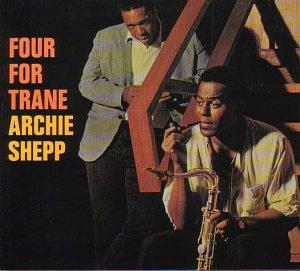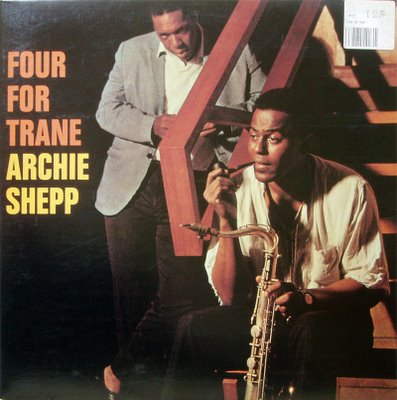
Archie Shepp
Four for Trane
Impulse! A-71
Stereo
1964
Side 1
- Syeeda’s Song Flute
- Mr. Syms
Side 2
- Cousin Mary
- Naima
- Rufus (Swung his face at last to the wind, then his neck snapped)
Personnel
ARCHIE SHEPP; tenor sax
JOHN TCHICAI; alto sax
ALAN SHORTER; trumpet
ROSWELL RUDD; trombone
REGGIE WORKMAN; bass
CHARLES MOFFETT; drums
Around this time, after some of the great tenor players that had come up over the preceding few years – figures like Coltrane, Rollins, Coleman – there was much talk of the ‘new’ thing, played by the ‘new’ tenors, the leading light of which was Archie Shepp. He had already made a splash with the New York Contemporary Five, playing in the emerging free jazz style as inspired by the likes of Ornette Coleman, Albert Ayler and Cecil Taylor. As a mark of respect from one of the new players to the leading member of the ‘old’ guard (and the guy who got him a contract with impulse!, no doubt), Archie Shepp went into the studio and cut stellar versions of four classic Coltrane tunes.
I say classic – they all dated from only a few years previously, 3 of the 4 cuts being from Trane’s classic ‘Giant Steps’, with the other being slightly later. And what tracks they are, too. “Syeeda’s Song Flute”. “Mr. Syms”. “Cousin Mary”. “Naima”. All arranged for a larger band with 4 times as many horns as Coltrane intended. ‘Naima’ is the standout track. What was a tender ballad in Coltrane’s hands – a reverential description of the love for his (then) wife – here becomes a spiky, angular exploration of sound. The famous opening theme is taken apart note by note and passed around the band in carefree form, in what is probably the most thrilling opening theme on the album. This is what happens when you take a solo saxophone line and split it between several horn players, and the result is electrifying.
This track is also a highlight for Shepp’s outstanding tenor playing, his sometimes abrasive tone softening during a solo section where the whole band lays out and gives Archie some room to breathe. Ah yes, to breathe. This is such a beautifully produced record that you can actually hear him breathing between phrases, and it just fits into the mood of the piece so well. And then, after the mood has become hushed, the track fades into a false ending and the band come back, playing at a much faster tempo, with a superlative trombone solo by Rudd, before heading back to the theme. This track ranks as one of the finest jazz recordings made, in my opinion – an already excellent track in Coltrane’s hands, given new vigour and an excellent arrangement by some of Jazz’s leading young players.
The other pieces are typically interpreted loosely by Shepp; 'Syeeda's Song Flute', in particular, keeps the tune and style of the original, but dispenses with Trane's smooth sound and introduces a much harsher tone. Indeed, Shepp was once described as 'a sheep in wolf's clothing', and this labum does much to prove that statement - despite his aggressive tone, he can play tunefully, and beatifully at some points.
The closing ‘Rufus’ is a Shepp original, and is a fine example of the freer style of the ‘New Thing’ that he was such a leading proponent of at the time.
The other players on the album are in good form too. Alan Shorter (Wayne's brother) more than keeps up his end on trumpet, while Roswell Rudd is always good value on trombone. The rhythm section is both propulsive and explorative, a quality often to be heard in Reggie Workman's recordings. Charles Moffett is a fine drummer - also reccomended is his work with Ornette Coleman on the live "At the Golden Circle, Stockholm" albums.
Links
Here's a link to an interview with Archie about music in general, which is well worth a read.
Archie Shepp's Official Site



No comments:
Post a Comment